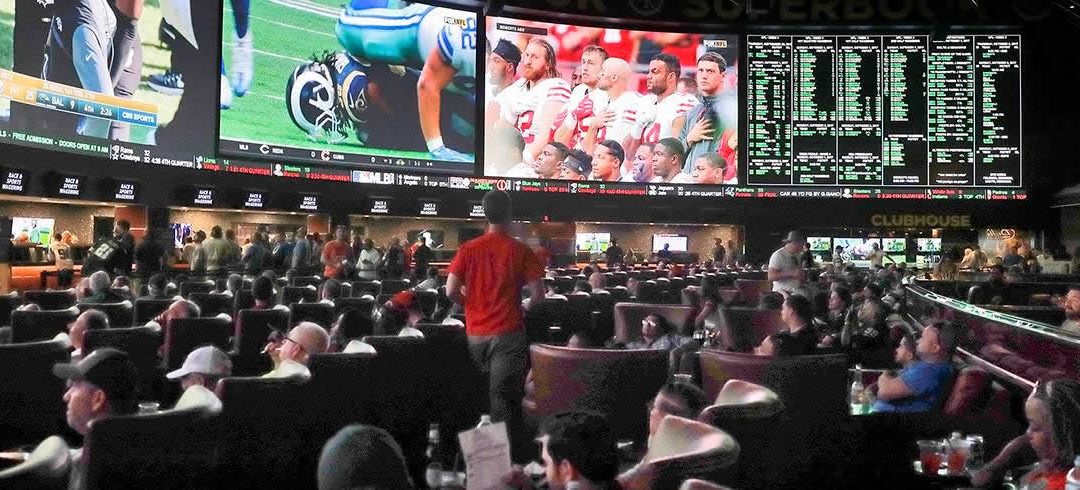- Legal sports betting is now being operated in seven states and is pending launch in nine states.
- New Jersey is the only state so far that has come close to meeting its previous projections for sports betting revenue. The state has mobile sports betting.
- The three most populous states in the U.S., California, Texas, and Florida, have been unable to gain any legislative traction in regards to legal sports wagering.
TALLAHASSEE, Fla. – With legislative sessions having either ended this year or coming to a close, the current landscape for legal sports betting in the U.S. is becoming quite clear.
The repeal of the Professional and Amateur Sports Protection Act (PASPA) in May of 2018 made is so that each state has the freedom to expand their gaming opportunities to include sports betting.
But factors such as state culture, state constitutions, and tribal compacts, have made it all the more difficult for the activity to spread nationwide.
Certain areas have shown a greater appetite to take advantage of the new state revenue to come from sports betting, having passed legislation or having introduced multiple bills. Others have remained reluctant to do so.
We’ve split the country into five areas to see where each region now stands on the issue.
The Northeast
The Northeast has undoubtedly taken the most progressive approach to legal sports betting in the U.S. In 2018, New Jersey, Pennsylvania, Delaware, and Rhode Island, all legalized and launched some form of sports wagering.
New Jersey, in particular, has reaped most of its tax revenue from mobile sports wagering in the state. According to the New Jersey Division Gaming Enforcement’s monthly sports wagering reports, 80% of all sports bets made in the state come from mobile devices.
So far in 2019, Pennsylvania has begun launching statewide mobile sports wagering apps and Rhode Island has passed a bill permitting their approved casinos to offer the same type of betting platforms.
To add to this, New Hampshire and Maine both have bills that have cleared both legislative chambers and are awaiting approval from their state’s governors.
Massachusetts has a chance to catch up with multiple proposals submitted in both the state House and Senate. The state’s legislative session does not end until December 31.
Connecticut legalized sports wagering in 2017 but is awaiting official regulations to be set before any sportsbooks can launch.
Maryland sports bettors will have to travel to the nation’s capital in order to put action on their favorite games. Washington D.C. approved sports wagering regulations earlier this month and is hoping to launch mobile sports betting apps later this year in time for football season.
The largest player in this region is undoubtedly New York. The state is preparing to launch retail sportsbooks at four of their upstate commercial casinos in the coming months.
A mobile sports betting bill did clear the state Senate in 2019, but it died in an Assembly committee due to concerns about the state constitution. The New York state constitution requires that any gambling expansion be approved via voter referendum, a process that could take three years.
The Midwest
The Midwest seems to be second in line when it comes to embracing the possibility to legalize sports betting. West Virginia took the lead by both legalizing and launching sportsbooks in 2018.
So far in 2019, Iowa, Illinois, and Indiana have all passed legislation that would permit both retail sportsbooks and state-wide mobile sports wagering apps to operate within their borders. Illinois is only waiting on Governor J.B. Pritzker to sign off on the bill to solidify the measure into law.
Both Michigan and Ohio have a chance to do the same. Each state has bills that are currently stuck in committee, but both of their legislative sessions last until the end of the year.
Missouri, Minnesota, and South Dakota were all in serious contention to legalize sports betting at the beginning of 2019 but were ultimately unable to for various reasons. Minnesota’s attempt, in particular, was shut down due to opposition from the state’s Native American tribes.
Kansas and North Dakota also had some sort of sports betting proposal submitted in one of their legislative chambers, but those proposals never had too much traction from the start.
Nebraska and Wisconsin were the only two states in the region to not introduce any possible sports betting bills in 2019. Direct opposition from Nebraska Governor Pete Ricketts ensured that in his state and Wisconsin lawmakers would have had to amend their state constitution to bring the activity to the Badger State.
The Southeast
Getting states in the Southeast to hop on board the current wave of sports betting may be harder than other regions of the country, due to the area’s conservative culture on gambling.
Mississippi was the only state in the region to legalize sports wagering in 2018 and continues to be the only state with active legal sportsbooks.
Arkansas, which legalized this expanded form of gambling in 2018, is set to launch retail sportsbooks sometime in 2019 and Tennessee recently passed the nation’s first “online-only” sports gambling bill without the signature of TN Governor Bill Lee.
Kentucky and Louisiana were both unable to get a sports betting bill in time to their governor’s office, but North Carolina still has a chance. The Tarheel State’s sports betting bill would only legalize the activity inside their tribal casinos, but it hasn’t seen action since April.
The state of Florida is the biggest player in this region but has yet to take any action to introduce a sports gambling bill.
The reason mainly stems from complications within the state’s tribal gaming compact. Amendment 3, which was approved by voters in 2018, also creates an even bigger dilemma in the state because now gaming expansion has to be brought to lawmakers by voters directly.
The Southwest
The Southwest can be seen as the region with the lowest number of states and the least amount of sports betting of any other area in the country.
Oklahoma ran into a similar situation as Florida in that introducing legislation may complicate the current tribal compact set in the state.
Arizona tried to create laws that would tie into their tribal compact by allowing tribes to operate sports wagering kiosks around the state. The kiosks would have counted against their allowed number of slot machines, but the bill ultimately failed to pass.
Two of New Mexico’s tribes have already taken matters into their own hands and have opened sportsbooks without the need to pass any bills to do so or re-work their compact in any way. They argued that sports betting fell in line with their current agreement with the state.
Texas, which has the potential to become one of the biggest if not the biggest sports betting market in America, has taken a relatively staunch opposition to the idea. A bill was introduced in 2019, but lawmakers’ conservative approach to gambling, in general, eliminated any possibility of it advancing.
The West
The remaining Western states have taken a mixed approach to sports betting.
Montana and Oregon, who were both grandfathered into PASPA, are set to officially launch sports wagering by late 2019. Colorado voters will have a chance to legalize sports betting this upcoming November as well.
Idaho, Wyoming, and Utah failed to produce any sports betting legislation in 2019, and given Utah’s strict gambling laws it seems unlikely that they will allow sports wagering in the near future.
Nevada remains king of all sports wagering in the U.S., despite other states trying to catch up. Both retail sportsbooks and mobile sports wagering apps have been legal and established in the state long before others could even create laws to compete.
However, if legal sports betting in California ever comes to fruition, Nevada would face immense competition. Luckily for them, the complications of California’s gambling industry eliminated the chance for them to introduce a sports waging bill in 2019.
Interest from California’s sports betting stakeholders such as Native American tribes, off-track betting facilities, cardrooms, and sports leagues all combine to create an incredibly difficult road to legalizing the activity in the Golden State.
Advertising Disclosure
In order to provide you with the best independent sports betting news and content LegalSportsBetting.com may receive a commission from partners when you make a purchase through a link on our site.
News tags: California | Florida | Gov Bill Lee | Gov Pete Ricketts | Gov. J. B. Pritzker | Illinois | Midwest | New Jersey | New York | Northeast | PASPA | Southeast | Southwest | Texas | US Sports Betting | West

– In his career, Hasan has worked both local and state government positions—including the Attorney General’s Office in Florida. On top of being familiar with the legislative process, he has also been researching and writing on the legality of sports betting across the US. Outside of work you’ll most likely find him producing or playing music, playing sports, or working on creative writing projects. You’ll also catch him at Doak Campbell Stadium cheering on the Noles.


 Bitcoin Sports Betting Sites
Bitcoin Sports Betting Sites Best Online Sports Betting
Best Online Sports Betting Famous Sports Bettors
Famous Sports Bettors States With Legal Sports Betting
States With Legal Sports Betting Sports Betting Events
Sports Betting Events




